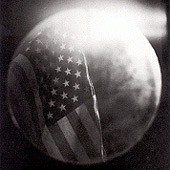 How long after an album is completed does it take to be released? A few weeks? A few months? Red House Painters' sixth full-length album came out earlier this week - three years to the month of its completion, tied up in major label buyout limbo and searching for a worthy new home. Thanks to the folks at Sub Pop for realizing this record, a warm welcome after years since Songs for a Blue Guitar.
How long after an album is completed does it take to be released? A few weeks? A few months? Red House Painters' sixth full-length album came out earlier this week - three years to the month of its completion, tied up in major label buyout limbo and searching for a worthy new home. Thanks to the folks at Sub Pop for realizing this record, a warm welcome after years since Songs for a Blue Guitar.
To put this into chronological perspective, step back a few years, before the John Denver, AC/DC tributes and compilation appearances, drop the needle or hit play and it seems like almost no time has passed since Blue Guitar. Make fun of singer/songwriter Mark Kozelek all you want for his taste in music (Yes, Wings, Cars, Genesis, and Kiss covers to name a few) but the man has written some of the most poetic lyrics and memorable melodies in the last ten years. RHP albums go through a few phases when they enter my collection: first there's the embryonic period, where it's a very personal thing - listening late at night and alone. Shortly they begin to accompany car trips and walkman usage, and only after a long while do they become introduced to a select few close friends. Years later, the songs become memorized classics in my mind, and this album is no exception.
Unlike the preceeding album and the second eponymous release, this disc is entirely made up of original songs, totalling over 70 minutes with only ten tracks. From the time the needle drops (or the CD player starts to whirl) until the end, RHP is a coherent band, executing with precision the wishes of Kozelek. The album's opener uncontrollably forces a smile when half way through the first verse you realize this is a song about missing his pet cat while on tour. By the fourth track, the Painters are in full rock band mode, with the distinct brand of distorted guitar-driven slow tempo oomph, sorta like a slow-moving Mack truck, similar to the sounds created on 95's Ocean Beach. Throughout the course of the disc includes familiar stories of traveling, memories and bad music references like Hanoi Rocks and Social Distortion. The sweet sustained guitar up against a slow motion last-call melody on "Smokey," a song written in tribute to John Denver shortly after his death is something one of Kozelek's biggest idols would be proud of. "Kavita," closes the album with another endearing, personal, heart-wrenching song of devotion, which in the last few seconds includes in-studio sounds like the ones that opened the album. Was it all done live to tape? Perhaps that's the impression we're supposed to get.
Kozelek's writing style has progressed from the first releases on 4AD, where most of the tracks were introspective first-person tales of life, love and childhood. In the period between '95 and '96, it seemed many of his songs were written for people, addressing them (basically using the second person), while here on Old Ramon, his lyrics have evolved to paint pictures, relaying stories that have affected Kozelek's life. Now that it's finally arrived, many RHP fans can breathe a sigh of relief and absorb the lastest batch of songs to learn and sing, but unfamiliar folks interested in a starting point would probably be best served by the Retrospective collection. As for me, I can already count about four times in the week since I've had this that I've started the music again right after it ended!
samples:
Read More

